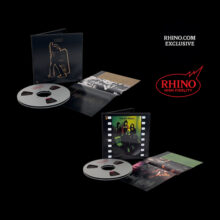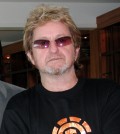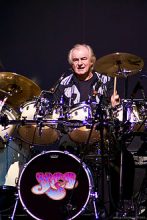Yes are one of the greatest bands of the rock era. After forming 35 years ago in Birmingham, England Yes went on to capture a world market alongside Led Zeppelin, Black Sabbath and Pink Floyd at the time.
They broke America big time in 1972 with the Fragile album and continued to creates classic for decades to come. But it wasn’t without a downside. Internal turbulence lead to the departure of various members on numerous occasions, some on multiple occasions. Rick Wakeman, for instance, left 5 times.
Lead singer Jon Anderson left and came back only to find himself in a real life Spinal Tap situation. He says he treated it like for 4 years.
What brought him back to taking it serious was the essential line-up. Jon Anderson (vocals) is currently touring with Rick Wakeman (keyboards), Chris Squire (bass), Alan White (drums) and Steve Howe (guitar).
Jon and Rick spoke with Paul Cashmere.
Paul Cashmere: Having survived 35 years, this is a band who transcends trends. Do you feel you could play this music forever?Jon Anderson: 30 years later the music is still pretty viable. We play it on stage and it sounds beautiful to us when we perform it. The audience loves it. It is timeless music to us.
Rick Wakeman: Music shouldn’t have a date stamped on it. Classical music doesn’t have the date stamped on it. If you listen to any of the 30 or 40 or so sonatas of Mozart nobody knows if he wrote one four years before another one. They are either good music and stand up or they don’t stand up. I think the media in the 80s is a lot to blame. When things became fashionable they started to have dates stamped on them. It got to the ludicrous stage where if a piece of music was two years old it was ready to be ditched. I think the new generation of writers and media have kicked that one completely. If it is good music, it lasts forever.
JA: Younger people are discovering the band and the history of the band and that is very good for us. It helps keeps the bands success going.
RW: I met some people recently in Japan. They were 18 or 19. I asked them how they felt about listening to old Yes music and they said “it is old Yes music to you but it is new Yes music to us”.
PC: Jon, Close to the Edge was a song you wrote with Steve Howe. Run us through the creation of that song. How do you go about creating an 18 minute epic?
JA: When we were working in that period of time it was a question of knowing we had a verse, a bridge and an introduction. The introduction became another part of the music. I always felt there could be a surreal centre to it and then get back to original. When we were all working we were working to piece together this structure and there were times when I even doubted if it would be finished correctly. Eventually it pieced itself together. There were one or two parts that not everybody agreed with. It was put together in one minute, two minute, one minute pieces. It was put together with cello tape. We played it back later that week and learned to live with it.
RW: There were parts we ditched. I have still got tapes of sections that didn’t work. We would either stick a bridge in or something in between or take something out and do it again. The great thing about the band at that time was that it wasn’t frightened. If you go into a studio and play something really well it wasn’t afraid to say it doesn’t work. I joined at Fragile so I was still pretty new to the band but at that time for those two albums we weren’t afraid to say if something didn’t work.
JA: When we first started to perform that piece of stage it seemed endless and difficult to perform but over the years it just got easier and easier. We now do most of that album. There is a lot of emotion to go through that music.
RW: I remember first trying to do ‘Awaken’ on stage and it was a wandering nightmare. There was nothing at the time that could create church organs and in fact I built a church organ to try to play it live. It was such a beautiful piece of music. We had got Close To The Edge off pat by then. We came to ‘Awaken’ and it was such a beautiful piece on record but I always came off frustrated when we did it live. Now it is the opposite. It is still a beautiful piece on record but I think we have taken it a stage beyond that. ‘Close To The Edge’ at the start, nobody had ever heard of doing an 18 minute piece of music. It was utterly ridiculous. Now it just seems like a normal thing. Yes certainly were pioneers.
PC: Did you use that template then to do your own albums like ‘Six Wives’ and ‘Journey To The Centre of the Earth’?
RW: I started doing Six Wives when Fragile was being done to honour an agreement. The band I was with before was The Strawbs. We were signed individually to A&M. The contract with A&M stated if any member of The Strawbs left, the label could call an album in. That’s what they did. On the first American tour I did with Yes in 1971 I was called into the A&M lot by Jerry Moss who gave me the magnificent sum of £4,500 to make an album. Obviously there are many influences in my solo stuff and Yes were definitely an influence in my solo stuff. Jon probably doesn’tknow but a lot of his voicings I took and used and tried to take one step further.JA: Each person in the band is so different. When we play together we create Yes music and without each other we can’t create Yes music. We all do different styles of music and different albums. That is why it works. There are 5 ingredients working to the best of their abilities.
PC: You came close to the sound of Yes on Olias of Sunhillow.
JA: That was more of me locking myself away and trying to learn instruments. A friend of mine went to college for 6 months and came back playing piano. That freaked me out so I went into my garage to play all these instruments. If you listen, musically, it obviously has some Yes overtones, but I could never play bass or drums or keyboards like any of these guys. I made it up as I went along.
RW: It worked though. That was the first time you had done anything like that. You didn’t have a chance to think what could go wrong. You didn’t know what your limitations were. You just went for it. If you had spent a couple of months behind hand trying to work these things out Olias of Sunhillow probably wouldn’t have ended up sounding like it did.
PC: Was the Jon and Vangelis era a creative outlet for you?
JA: Totally, yeah. In as much as Rick had the chance to do his solo work, I bumped into this guy Vangelis in Paris and became friends. He became like a mentor to me and showed me a totally different way to make music than what I was doing with Yes. We did three or four albums together that were more like going on holiday.RW: There was no pressure was there.
JA: No, we just recorded. We would do a song every afternoon for three weeks then compile them and that was it. We spent more time in a café around the corner talking about different things as Greek people will do.
RW: The thing that freaked me out was the name Jon and Vangelis. It sounded like a little pop duo. All the bands at the time were like Heavy Jelly or Pink Gunk and then here comes Jon and Vangelis.
PC: ‘Your Move’ was the first Yes song to make the Top 40 charts. That must have been bizarre for a band like Yes to have a hit single.
JA: We weren’t prepared. We didn’t make music thinking about a single. The record company used to get the scissors out and chop them up. For ‘Roundabout’, we never heard the edit.
RW: There was a 7 or 8 bar edit in it. They did this edit except that the guy who cut it up (and to this day nobody has every owned up to who did it), made it that you can’t actually tap your foot. It was bizarre and it was a Top 3 hit in America.
JA: And ‘Your Move’ was part of a two piece section for ‘I’ve Seen All Good People’. There was the ‘Your Move’ section that was part of a 7 minute song. People just took ‘Your Move’ out. Luckily it got played a few years ago in the movie Almost Famous. When we play it on stage people remember it from that movie.
PC: ‘Fragile’ was a Top 3 album in America. Was that when you knew you were successful?
RW: I tell you what was interesting. We played on tour in America in 1971. It was my first tour in America and we played the ‘Fragile’ album before it came out. Bands wouldn’t dream of doing that now. We only played 35 minutes on stage in those days and we managed to get in ‘Roundabout’ and we played ‘Heart of the Sunrise’. We played ‘Heart of the Sunrise’ to a completely bewildered audience. That was amazing. When the album came out it really kicked.
JA: At that time during that period we were so interested in the musicality of what we had become we didn’t look at the charts. We talked about where we were going and that is why we were able to jump from ‘Fragile’ to ‘Close To The Edge’ in less than a year. The door was open and we were given the opportunity to make the music we wanted to make.
RW: And we had management and a record company which left us alone. They never, ever said what we should do. It was just get on with it. Oh for that era to return. Not just for us but for other young bands. Record companies should just stand back and do what their job should be and management should let musicians do it. You don’t do it to a writer. I have a friend who is a writer and he was stunned when I told him what record companies do now. He said “Can you imagine me as an author going to my editor and him telling me that he is really looking forward to my new book but please make sure there is at least three rapes, a boat sinking and a plane crash, some racism and a couple of murders because that’s really popular now”.
PC: So you wouldn’t be surprised at the state of the music industry now then.
RW: Not at all. It has been created purely by the people who run it and the media who have dictated rules either through advertising or revenue or for money and that is why record sales are way down on where there were. It is the Pan-Am syndrome. Pam-Am thought they were too big and nobody could ever touch them. All of the big record companies when downloading started said “it will never happen, it will go away”.
PC: Could a band like Yes start now?
JA: Not 10 years ago. We were lucky. We could go out on tour and not worry about record sales.
RW: We were in New York at Radio City Music Hall night after night with no album out. Just up the road The Who did four dates with 88,000 without a record out. And at a nightclub that holds 600 you have a record company who shall remain nameless spending like thousands of dollars on an act who mimed trying to break them. You would think that record companies would just cotton on a little bit. I have this theory that record companies need to take a leaf out of Sport. For example in golf in the PGA, you have senior players. So what they did, they formed the senior tour but it was run by people who knew how to reach those people. You don’t promote a band like Yes with videos and naked girls (although it is a lovely thought). Record companies have 25 year olds who wouldn’t have a clue who Yes are and until they change their tune it is going to be difficult.
PC: 1981 was a difficult year for the band. It was the year you both left.
JA: We were tired. We were tied of each other and tied of the business around us. We were being pressured to do more commercial songs because Foreigner and Journey were selling so many records and we were told we weren’t. They actually got the producer of that band to come and produce us. He was just a wild man who loved to party and wasted our money. I just couldn’t handle it. Me and Rick had a tough time in Paris and just split. Actually Alan (White) broke his ankle and that made us sit back and think let’s forget about it for a while.
PC: Back in ’83 when Trevor Horn was involved. Was that a good experience?
JA: It was great for a few reasons. I was in London and Trevor played me this music and I loved it. I was into The Art of Noise. That was Trevor Horn. I was really knocked out by the whole stylistic way of recording. He asked me to sing on it and gave me some money and I was back in the band. The week we were going to start touring, I was driving with a young film guy to Boston. I went to see Spinal Tap and from that moment I was in Spinal Tap. I didn’t see anything but Spinal Tap for the next two years. We saw Tap and my life changed. I didn’t take anything seriously for that period until when I got back together with Rick and Steve and Bill and we did an album called Anderson, Bruford, Wakeman and Howe. I wanted in a way to reinvent who we were and we did. 10 years on here we are. The potential has returned and we do create this certain sound. The breakup and whatever you go through are part of life.
PC: I wanted to run through a list of sessions you have done Rick. You’ve done many Bowie albums including Ziggy Stardust.
RW: Yeah
PC: Cat Stevens ‘Teaser and the Firecat’?
RW: Yep
PC: Ozzy Osbourne and Black Sabbath.
RW: I did Osmosis with Ozzy.
PC: Electric Warrior by T Rex.
RW: And I’ve done Lou Reed as well. There is a guy in America who made a list and collected the music of every session I have played on. It is about 2,300 tracks I have played on.
PC: You were on Elton John’s ‘Madman Across The Water’. Why did Elton need another keyboard player?
RW: Because Elton hated playing the organ. We were good friends. He called me up. The late Gus Dudgeon was producing. He called me and said Elton hates playing organ. He likes playing piano but hates the organ so will you come in and do all the organ parts. I was delighted to. That was at Trident Studios. Elton basically at that time recorded everything live. You went in and the band was there, the orchestra was there. You would literally have one run through. Maybe not even that. You would get a quarter way through and he’d say “that’s the feel” and away you would go. Invariably that was it. He was all about the feel of playing something great the first time. I enjoyed doing that.
PC: I have these old visions of you in Yes with that wall of keyboards surrounding you. With technology today, how simplified can you do it now?
RW: It got ridiculous at one stage. I know there were 34 keyboards on 3 levels. That was in the day when keyboards just did one job. Nowadays they do so much more. On the other hand because they can do more music has become more musical. There were sounds before that you couldn’t do on stage that you can now do. You might ditch a few keyboards but you need to bring in another one to do the sound you couldn’t do before. I’ve got a set-up now that is the best set-up I have ever had. Whatever we want to do I know I have the capabilities to do it.
PC: Jon, Simon and Garfunkel’s reunion has just been announced. They were very influential for you when you started out, weren’t they?
JA: We covered their ‘America’. In those days we were into reassembling the song. We would do a Beatles song or a Simon and Garfunkel song. It is funny, a lot of people only know our ‘America’. I have people say to me “I just heard the original but I prefer yours because you were rocking and rolling” but I listen to the original and it is a gem. Like most people I am a big Paul Simon fan and the fact they are getting back together is good. It is a full circle.
RW: They always said they would never get back together and they have. It’s a new millennium and new thinking and young people are discovering this music and saying they want to see these people. They don’t care how old the music is. People are hearing Sinatra for the first time. My daughter is 20 and she is so into Sinatra. There are all these great songs. She couldn’t care less when they were written.
PC: It’s always new first the first time you hear it.
RW: Exactly. It is always new music the first time around.
——————————————————————————————————————————————
Never miss a story! Get your free Noise11.com daily music news email alert. Subscribe to the Noise11 Music Newsletter here
Listen to the Noise11 Music News channel now at iHeartRadio
Follow Noise11.com on Facebook and Twitter
NOISE11 UPDATES are now in Apple News

















